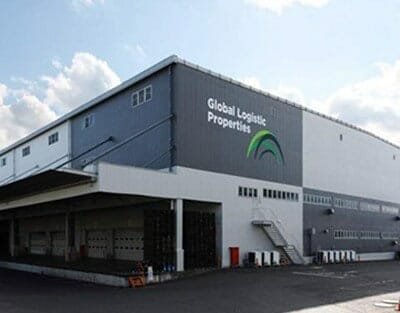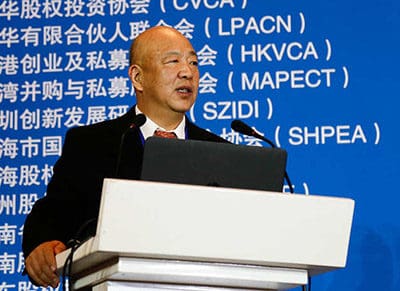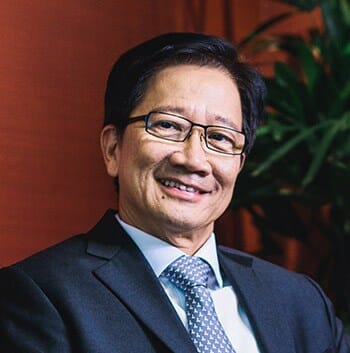
GLP CEO Ming Mei just made himself Asia’s first warehouse billionaire
The major shareholders of Global Logistic Properties chose a quick and tidy $11.6 billion sale of Asia’s largest warehouse developer following months of controversy, with GLP announcing on Friday a proposed acquisition of the company by a group led by its CEO.
In acknowledging the offer by Nesta Investment Holdings, a consortium led by GLP CEO Ming Mei, together with mainland investors Vanke, Hillhouse Capital, HOPU Investments and an affiliate of Bank of China, GLP is said to have passed on an opportunity to sell the developer to a higher bid from a competing investment group led by private equity firm Warburg Pincus, according to sources familiar with the process who spoke with Mingtiandi.
The proposed acquisition is a major coup for Mei, with the terms of the deal including a stake in the company worth more than $2.45 billion for a private holding company founded by the corporate executive. GLP kicked off the sale process late last year at the request of GIC, following an unsolicited bid for the company by a group believed to be led by Mei.
GIC Happy with 25% Premium
In a statement regarding the proposed acquisition, GLP’s largest shareholder, Singaporean sovereign wealth fund GIC, endorsed the deal, saying that it had provided a commitment to support the Mei consortium’s bid based on “both the price and certainty of execution.” The offer exceeded GLP’s last traded share price of S$2.70 per share by more than 25 percent.
GLP noted in its own statement regarding the proposal that it considered the Mei-led offer “superior due to price certainty, limited conditionality and a defined completion timeframe.”
Other bidders are said to have offered a higher price than the Nesta group, according to sources familiar with the process, who spoke with Mingtiandi on condition of anonymity. Lacking the detailed knowledge of the company’s operations that GLP’s own management team possessed, however, outside buyers are likely to have asked for greater warranties and placed protections on their bids that an inside bidder may not have required.
GLP Wards Off Claims of a Flawed Process

If you put 530 million square metres of these things together, they could be worth $11.6B
The company’s decision to favor the management-led consortium’s bid for reasons of limited conditionality and clearly defined timeframes for completion could be seen as giving credence to claims from other investors that the GLP sales process had been slanted in favor of the Mei bid.
During May, GIC representatives are said to have complained to GLP about slow-motion sharing of key information with potential buyers and excessive redacting of documents, which made it difficult for outside bidders to prepare their proposals. GLP ultimately responded by extending the sale process by an additional month, until June 30th.
After US private equity giant Blackstone reportedly dropped out of the bidding last month, an article in the Financial Times quoted sources familiar with the GLP sale as saying that potential buyers for the company believed that the insider bid assembled by Mei and Fang “made other submissions pointless.” In the end only the Mei Group and Warburg Pincus, which offered together with mainland retail giant Suning, bothered to submit formal bids, according to informed sources who spoke with Mingtiandi.
“The process is a farce and the most unprofessional I have ever seen,” a private equity executive interviewed by the Financial Times said earlier in the sale. “No fair play.”
In its statement on Friday, GLP chairman, Seek Ngee Huat, who led the Special Committee of the developer’s board which conducted the sale process said, “The Special Committee, with guidance from our financial adviser J.P. Morgan and legal adviser Allen & Gledhill, conducted an in-depth and independent review in order to achieve the optimal result for all shareholders. After an extensive evaluation of all final proposals received, the Special Committee decided on the proposed Scheme, which we believe is compelling and value-enhancing for all shareholders.”
Ming Mei Becomes Asia’s First Warehouse Billionaire

Hopu’s Fang Fenglei has been a major force in this deal
While the GLP sale process presented problems for rival bidders, it has proved to be a boon for Ming Mei.
Under the terms of the proposed acquisition, Mei’s SMG Eastern Ltd would own a 21.2 percent stake in the warehouse developer, which owns or leases a total area of 530 million square meters (5.7 billion square feet) of logistics facilities globally. An account in respected Chinese financial publication Caixin indicated that SMG Eastern is owned by Mei personally, and the company documents filed with the Singapore exchange listed SMG as a being co-founded by Mei.
Aside from Mei, the other members of the Nesta Consortium are major corporations or institutional investors. Leading developer China Vanke would take up a 21.4 percent stake in GLP through the proposed deal, with HOPU Investments, which is headed by former Goldman Sachs partner Fang Fenglei in for a 21.3 percent share.
Private equity investor Zhang Lei’s Hillhouse Capital, which had already invested in GLP’s listed shares, would also take a 21.2 percent stake, while Bank of China Global Investors would be buying a 15 percent portion.
While it is not clear how Mei as a private individual is coming up with the cash for his investment in GLP, a HOPU-led 2014 investment in GLP’s China operation could provide a model. As part of that $2.1 billion acquisition of an approximately 30 percent stake in GLP China, Mei, together with now-deceased GLP co-founder Jeff Schwartz, received financing from the HOPU-led consortium to purchase shares together with the outside investors.
Corporate Governance Questions Remain

GLP chairman Seek Ngee Huat led the sale process
While GLP received GIC’s support for the Nesta offer, by passing up a potential higher return for its shareholders in favor of a deal which benefits its CEO, the company will continue to leave itself open to questions regarding its corporate governance.
In a report last month, Mingtiandi documented how GLP had made a series of investments in, or made business deals with, mainland companies that had received funding from Eastern Bell Venture Capital, a Chinese venture capital company chaired by Ming Mei.
While GLP has insisted that the company’s investments in the Mei-backed ventures, and its business dealings with entities where Eastern Bell is a stake holder, do not represent a conflict of interest, other observers have looked at the cases differently.
“A lesson in “Corporate Governance – what not to do 101,” is how a fund manager with a European pension fund termed GLP’s deals with the Eastern Bell-backed companies, adding that the company’s practices were “poor form.”
The proposed offer by the Nesta consortium still requires approval by GLP’s shareholders and Singapore’s High Court. In its statement, GLP said it expects the process to conclude by 14 April 2018.
Leave a Reply